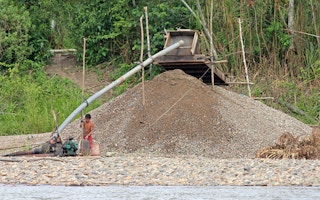As the world’s largest terrestrial carbon sink, the Amazon is a key front in the fight against climate change. But it is also host to a thriving criminal underworld that could undermine efforts to reduce greenhouse-gas emissions. In fact, reversing climate change is not just about regulating polluters; it is also about fighting organised crime.
Deforestation in the Amazon has accelerated rapidly in recent years, resulting in a dramatic loss of tree cover. Since the 1970s, around one-fifth of the area has been razed for agro-industry, logging, and mining; 50-80 per cent of that deforestation is due to illegal activities, including gold mining. If the current trend continues, another 20 per cent of existing tree cover will be gone by 2030.
Among the many threats to the Amazon, mining is especially destructive, because it also strips away earth, prevents regrowth, and pollutes rivers. Nonetheless, large mining corporations such as Anglo American and Vale have spent tens of billions of dollars to build access roads into some of the Amazon’s—and the world’s—most environmentally vulnerable regions. They have been abetted by politicians, who issue generous tax incentives to scale up extraction of bauxite, copper, iron ore, manganese, nickel, tin, and especially gold.
And now, Brazil’s newly elected president, Jair Bolsonaro, has promised to give mining giants access to even more protected lands, including areas belonging to indigenous communities. The Bolsonaro government’s approach to the Amazon is directly at odds with its promise to crack down on corruption. By weakening government regulatory bodies, offering more tax subsidies and incentives to logging and mining companies, and selling off land, it will further embolden those engaged in organised crime.
“
Since the 1970s, around one-fifth of the area has been razed for agro-industry, logging, and mining; 50-80 per cent of that deforestation is due to illegal activities, including gold mining.
Tens of thousands of garimpeiros, or artisanal gold diggers, already depend on illegal gold mining to survive. In small Brazilian towns like Itaituba, along the Amazon River, illegal mining accounts for 50-70 per cent of the local economy. And an estimated 20,000 Brazilians work in clandestine mines on the border with French Guiana. As makeshift settlements continue to spring up across the region, gambling, prostitution, human trafficking, slave labor, and violent crime are on the rise, and indigenous and quilombola (Afro-descendant) people are bearing the brunt of the costs.
But wildcat miners are hardly the only players scrambling for Amazonian riches. Because the Amazon basin straddles the world’s three major coca-producing countries—Bolivia, Colombia, and Peru—Colombian/Peruvian cartels and Brazilian gangs have also gotten into the business of illegal gold mining. They have found that gold—easy to extract and sell for an attractive market price, and rendered safe by complicit government agents where it is mined—is often a safer financial bet than cocaine.
Hence, criminal groups are expanding their involvement in illegal mining. Along the Brazilian-Colombian border, for example, former members of the now-disbanded Revolutionary Armed Forces of Colombia (FARC), as well as the still-active National Liberation Army (ELN), control large mining sites.
And while the Brazilian military and Colombian authorities have conducted operations to wrest back control of these areas, they are often outgunned. Making matters worse, some senior Venezuelan government officials, seeking to supplement declining oil revenues with those from illicit gold, are supporting criminal groups in Western Guyana and Northern Brazil.
All of this is having dire environmental consequences. For starters, mining is fueling much more deforestation than previously thought, and now accounts for an estimated 10 per cent of the decline in tree cover.
Beyond that, dredged and dynamited rivers are destroying local ecosystems and releasing mercury into food supplies across the basin. In some Yanomami villages on the Brazil-Venezuela border, more than 90 per cent of recently tested individuals were found to be contaminated.
Moreover, there are worrying signs of increased violence near illegal mining sites, with the Amazonian cities Belém, Macapá, and Manaus currently registering homicide rates that are among the highest in the world. They are also among the most dangerous places on the planet for environmental activists and journalists.
Tackling the criminal activities that are contributing to climate change will require increased investment in, and coordination of, federal police, prosecutors, public defenders, intelligence agencies, and the armed forces. Public agencies like Brazil’s Institute of Environment and Natural Resources (IBAMA) need a cash injection and more autonomy, and poorer areas ravaged by illicit gold mining need targeted investment, so that their young men will not be drawn toward crime.
Stewardship of the Amazon is in the entire world’s interest. Yet international cooperation has been lacking, especially within South America. For example, the Amazon Cooperation Treaty Organization (ACTO)—comprising Brazil, Bolivia, Colombia, Ecuador, Guyana, Peru, Suriname, and Venezuela—has gained little traction, owing to member-state governments’ wariness about infringements on their national sovereignty. Confidence measures will be needed to address such concerns.
When it comes to fighting environmental crime, a coordinated approach is the only option. The elites, bureaucrats, and criminals profiting from illegal mining will have to be confronted, which will require courage on the part of elected officials and activists.
But there are also technical solutions, such as the satellite-monitoring systems that the Bolivian and Peruvian governments have deployed against drug traffickers. And, of course, traditional policing operations have an important role to play—though they must be conducted with respect for human rights.
More broadly, durable progress will depend on high-level political action. National governments need to align their environmental and security priorities, both internally and multilaterally, and this will require careful diplomacy; robust, coordinated oversight of extractive companies; and a commitment to transparency, with penalties for non-compliance. The broader international community should support such efforts. Our common survival may depend on them.
Robert Muggah is co-founder of the Igarapé Institute and SecDev Group. Adriana Abdenur is Coordinator of the Peace and International Security Division at the Igarapé Institute. Ilona Szabó is the co-founder and executive director of the Igarapé Institute.
Copyright: Project Syndicate, 2019.
www.project-syndicate.org



















